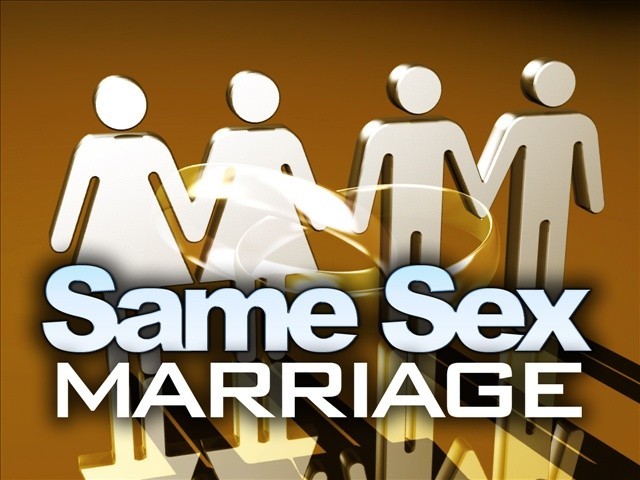It's a formula picked up from their fellow activists who made Chicago an influential player in the push for immigrant rights.
Proponents will try again this fall to push gay marriage legislation through the Illinois Legislature, where they fell a few votes short in a Democrat-dominated state that's been surprisingly resistant. But this time, they're focusing less on lobbying lawmakers and more on priming the environment to make it easier for skittish legislators to cast favorable votes - taking cues from a movement that brought nearly 500,000 protesters to Chicago streets a few years ago and helped advance "Dream Act" goals this year.
"The immigration advocates, they really know how to get it done," said Jim Bennett, a director for Lambda Legal, a gay rights group that's part of the Illinois Unites for Marriage campaign. "We have a lot to learn from them."
While social justice movements often borrow tactics from one another, experts agree the overlap in Illinois stands out among the 13 states that have embraced gay marriage - particularly in the union connections and emphasizing the development of young, long-term leaders.
At the heart of the renewed push is John Kohlhepp, a lobbyist for Illinois' biggest state employee union. He was hired to lead a coalition that since June has grown from three organizations to roughly 50, including other unions, and raised roughly one-quarter of the campaign's $2 million.
On the campaign trail, Kohlhepp's energy ripples out to the nearly 20 field organizers who have been distributing leaflets at events this summer, including the State Fair and Chicago's Bud Billiken Parade, the largest African-American parade nationwide. Kohlhepp's cellphone rings constantly with contacts through the American Federation of State, County and Municipal Employees Council 31, from which he has taken a leave. A seasoned lobbyist, he marks time by counting the days to Oct. 22, when legislators return to Springfield.
His involvement shows the strongest link yet between unions and the gay marriage campaign, according to Mary Bernstein, a University of Connecticut sociology professor who tracks social movements. That relationship resonates in labor-friendly Illinois, where immigrant-rights activists and unions made early links that are now hard to separate.
Unions, for example, helped Illinois become the first state to challenge the federal e-Verify immigrant worker identification system, and workers' groups have pushed for fair immigrant wages.
Bernstein said the Illinois collaborations appear to be an "innovation."
Nationally, the two movements have picked up ideas from one another before. Students without legal immigration status have "come out" in public ceremonies - Chicago was among the first to hold such events - and some immigrant activists say they look up to the late Harvey Milk, California's first openly gay elected politician and a renowned organizer.
The push for gay marriage in Illinois started in earnest after lawmakers approved civil unions in 2011. But after it passed the Senate, House sponsors ultimately declined to call a vote on the same-sex marriage bill before legislators adjourned in May.
Proponents believed they were just a few votes shy, and intense lobbying efforts to find support for the bill were focused on moderate Republicans and black Democrats.
But since then, the American Civil Liberties Union has hired former state Republican Party Chairman Pat Brady, a gay-marriage supporter, to help lobby Republicans. And organizers hope to capitalize on a recent U.S. Supreme Court decision that invalidated parts of the Defense of Marriage Act and polls showing more public support.
"There's really a different story to tell to my colleagues," said Rep. Greg Harris, the main House sponsor.
However, the campaign still faces significant obstacles: Illinois conservatives and some religious leaders are equally strong in their opposition.
Bishop Lance Davis, of New Zion Covenant Church in the Chicago suburb of Dolton, said his coalition of black churches intends to continue fighting same-sex marriage legislation out of a belief that marriage is between man and a woman. Several of the mega churches the coalition represents are key in voter registration drives and host politicians before Election Day.
Davis said he believes the Supreme Court's decision, along with activists trying to bring same-sex marriage, is "a redefinition of the institution of marriage."
But other churches have supported the cause, and activists hired an openly gay minister to reach out to more congregations
When the push for gay marriage began in Illinois, advocates likened it to the historic struggle for civil rights. That resonated with young people but irked others, particularly blacks. Davis was one of the most vocal critics.
This time around, the advocates are putting their focus on family and commitment issues. They are encouraging same-sex couples to relay personal experiences, which was also part of the successful gay-marriage campaigns in Connecticut and Minnesota this year.
"The movement has learned what kind of messaging has resonance for people," Bernstein said. "The civil rights discourse has been divisive for a long time ... Everyone understands love and commitment."
That includes taking another cue from the immigrant rights movement. In 2006, when Congress considered a bill that would have made being an illegal immigrant a felony, massive crowds took to the Chicago's streets to protest. Activists told their personal stories of hardship and argued that deportations pull apart families.
"What this will take (to win the gay marriage battle) is folks telling their stories," said Keron Blair, who directs campaign field organizers.
Ultimately, organizers say, the overarching mission is to inspire leaders who will push for future gay rights issues - just as a new crop of young activists with roots in Chicago are doing both at home and in Washington D.C.
"If we left behind leaders like that, I'd be ecstatic," said Kohlhepp, the union lobbyist now heading the same-sex marriage coalition. He said accomplishing that goal would be "an imprint of the campaign."

http://accesswdun.com/article/2013/8/265084
